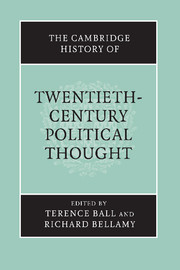Book contents
- Frontmatter
- Editors’ introduction
- Part I The changing fortunes of liberal democracy
- 1 The coming of the welfare state
- 2 Politics and markets: Keynes and his critics
- 3 The advent of the masses and the making of the modern theory of democracy
- 4 Nationalism and imperialism
- 5 Fascism and racism
- 6 Conservatism
- 7 Christian democracy
- 8 Critics of totalitarianism
- 9 The end of the welfare state?
- Part II Varieties of Marxism
- Part III Science, modernism and politics
- Part IV New social movements and the politics of difference
- Part V Beyond Western political thought
- Biographies
- Bibliography
- Subject index
- Name index
- References
6 - Conservatism
from Part I - The changing fortunes of liberal democracy
Published online by Cambridge University Press: 28 March 2008
- Frontmatter
- Editors’ introduction
- Part I The changing fortunes of liberal democracy
- 1 The coming of the welfare state
- 2 Politics and markets: Keynes and his critics
- 3 The advent of the masses and the making of the modern theory of democracy
- 4 Nationalism and imperialism
- 5 Fascism and racism
- 6 Conservatism
- 7 Christian democracy
- 8 Critics of totalitarianism
- 9 The end of the welfare state?
- Part II Varieties of Marxism
- Part III Science, modernism and politics
- Part IV New social movements and the politics of difference
- Part V Beyond Western political thought
- Biographies
- Bibliography
- Subject index
- Name index
- References
Summary
Although conservatism in the twentieth century has yielded a diverse body of literature, it is unified by a common object of hostility: namely, the progressive view of humankind and society. The main conservative objection to this view is that it vastly exaggerates the directive power of human reason, on the one hand, and the creative power of human will, on the other. Reason, as the British conservative Michael Oakeshott maintained, is always parasitic on tradition, which it can only ever ‘abridge’ (Oakeshott 1991 [1962]). So far as the relative impotence of human will is concerned, the American thinker John P. East strikes a characteristically conservative note when he writes (in the course of a sympathetic exposition of the thought of Leo Strauss) that: ‘man is not the Creator, he is the creature; he is not the potter, he is the clay. It is then man who adapts to creation, not creation to man – to propose the latter is to propose perverting the natural order of things’ (East 1988, p. 265).
This critique of rationalism and voluntarism is supported by the conviction that twentieth-century politics is dominated by a conception of human nature which mistakenly implies that humans are malleable and perhaps perfectible creatures of infinite possibilities. Such a view permits any existing social order to be portrayed as a system of oppression, regardless of the fact that a majority of its members may support it. If conservatives generally agree on what they reject, they are less united on what they support. Traditionally, they have favoured an organic theory of society, in which individual reason and will do not construct but are produced by the social order.
- Type
- Chapter
- Information
- The Cambridge History of Twentieth-Century Political Thought , pp. 151 - 164Publisher: Cambridge University PressPrint publication year: 2003
References
- 4
- Cited by

